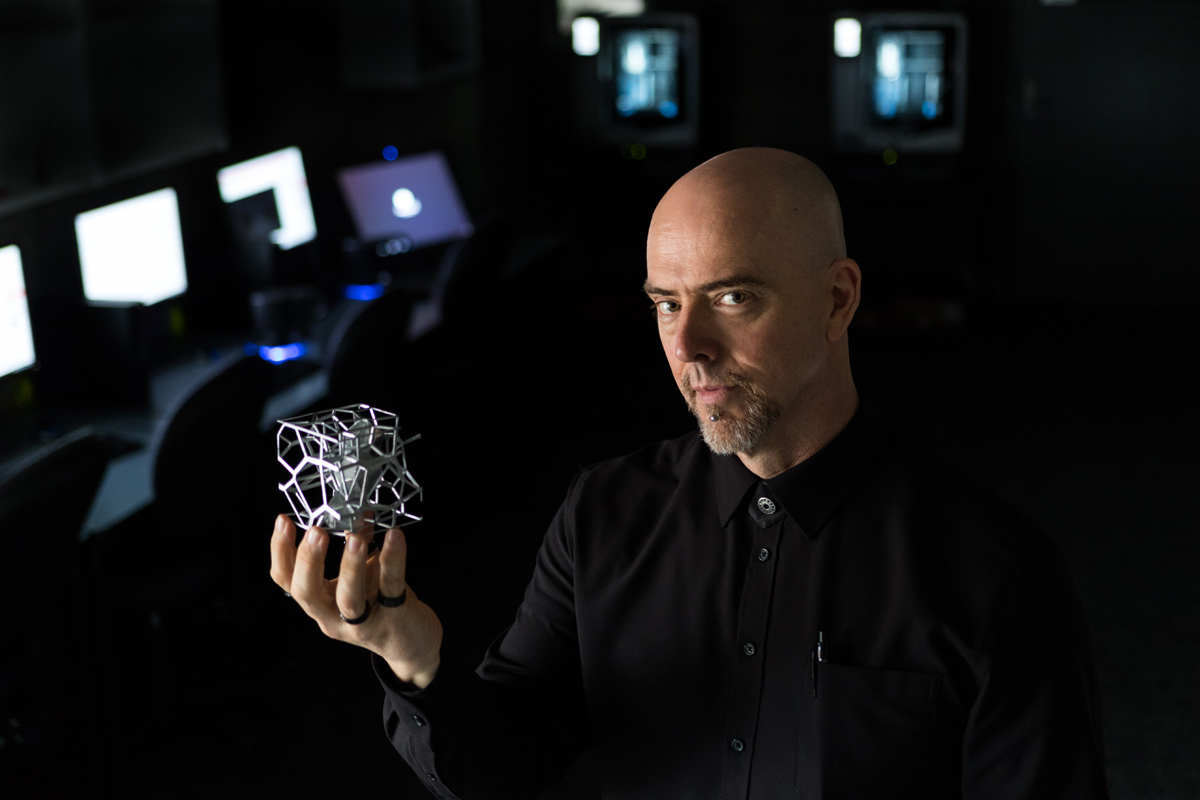Researcher Highlights
Ethics and the architecture of objects
Senior Practitioner Fellow Warren Reilly
Dr Warren A. Reilly, Senior Practitioner Fellow in the Faculty of Engineering and Built Environment, is a fearless innovator, and an unexpected beacon illuminating the intersection of equity, sustainability, creativity and form.

Before he began teaching at UON in 2010, Warren was involved in the private product design sector for more than twenty years.
He brings to his teaching role technical skill honed by designing and project managing the construction of everything from naval vessels, to medical implants, trains, and primate enclosures.
Through the synthesis of his extensive industry experience in managing people, projects and technology to the tune of more than two billion dollars, Warren has developed firm opinions about the ethics and future of design, and the skills necessary for the new generation of designers.
And he doesn’t pull any punches.
“Product design worldwide is no longer about pumping out plastic products that endanger sea turtles, increasingly it’s more about what should we make as opposed to what can we make.”
Building skills
As the program convener for Industrial Design, inside the School of Architecture and the Built Environment, Warren is in just the right place to be influencing the future of the design sector.
A deep practice background and late entry to academia have lead Warren to focus his efforts at UON on preparing its design graduates for life beyond academia.
But despite the course name, Warren isn’t making industrial designers so much as problem solvers, collaborators, translators, negotiators, innovators, and agents of social change.
And his innovative approach to education has been recognised by his students, colleagues and the University.
In 2015, Warren was awarded the Faculty of Engineering and Built Environment Award for Teaching Excellence as well as the Vice Chancellors Award for Teaching Excellence and Contribution to Student Learning.
These awards were followed the next year, 2016, by the Faculty of Engineering and Built Environment Award for Collaboration and Innovation.
Translators
From conceptual rendering to internal form studies, reverse engineering to rapid prototyping, Warren has a massive bank of practical skills to impart.
But he believes that the success of any collaborative project is also dependent on the designer’s ability to absorb, validate and synthesize sometimes wildly disparate needs.
An example would be his role with the recent Taronga Zoo Chimpanzee enclosure upgrades. “The engineer and the primate handler would have a very different idea of how a chimp enclosure should look and function, and probably use very different language to communicate that,” Warren says.
It is here the designer takes the role of translator and negotiator to ensure aesthetics, safety, reliability, functionality and affordability are all communicated and addressed.
Technical skill informs another form of translation as the designer utilizes traditional and digital means to translate ideation to prototype through the creation of an unambiguous, tangible object reflecting the needs of the team.
Students are taught skills all the way through to manufacturing and commercialisation, to increase their effectiveness within project teams or as solo operators.
Innovation
Innovation is an integral part of his practice, inspiring Warren to multidisciplinary collaboration. “Innovation is what happens when very different skill sets bump into each other and new eyes notice possibilities that have been undiscovered or discounted,” Warren says.
His talent at adapting Design Thinking methodologies to redress challenges has seen Warren become sought after at the University of Newcastle as a problem solver and content leader, developing new programs within his school and in partnership with others.
He was directly involved in the development of UON’s new Master of BioInnovation and Design, and is looking forward to evolving the relationship between his area and the revamped Creative Industries at UON.
Warren stresses that technical skill and Design Thinking is something you can learn regardless of your academic leanings and aims to make his courses available to everyone on campus.
“So, if you are in Business and Law or in nursing and you want to find out how designers think and what designers do, come over and have a design experience,” he says.
Designing for health
Health professionals are one group that Warren actively seeks out to work with his students.
Stroke recovery, architectural concessions for users with Autism Spectrum Disorder, and improving access for the vision impaired are topics Warren encourages his students to problem solve.
Teaching subjects such as Design for Innovation, and leading students through their Industrial Design Professional Projects, Warren isn’t interested in the constant reinvention of the wheel.
Not when there are real issues that need solutions.
Warren also teaches Sustainability in Design, advocates for the local economy and preferencing products that facilitate the replacement of separate components as opposed to those that wear makes prematurely redundant.
“Industrial design has been criticised for focusing on making executive bespoke toys for the richest 5% of the world’s population.”
“Globally, the discipline has ethically evolved. We hear from our students it is more important for them to focus on improving toilets for people in Nepal, than it is about making a more expensive watch,” Warren says.
“Fortunately, the students coming through, the 16 to 25 year olds, they are more interested in making a social change than just filling up a bank account somewhere,” Warren explains.
“So, what happens when you take this horsepower and apply it to the 90% of people on the planet who desperately need it? That's when awesome things happen”
The University of Newcastle acknowledges the traditional custodians of the lands within our footprint areas: Awabakal, Darkinjung, Biripai, Worimi, Wonnarua, and Eora Nations. We also pay respect to the wisdom of our Elders past and present.